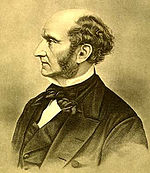Portal:Business
The Business and Economics Portal Business is the practice of making one's living or making money by producing or buying and selling products (such as goods and services). It is an activity or enterprise entered into for profit." A business entity is not necessarily separate from the owner and the creditors can hold the owner liable for debts the business has acquired. The taxation system for businesses is different from that of the corporates. A business structure does not allow for corporate tax rates. The proprietor is personally taxed on all income from the business. A distinction is made in law and public offices between the term business and a company such as a corporation or cooperative. Colloquially, the terms are used interchangeably. (Full article...) Economics (/ˌɛkəˈnɒmɪks, ˌiːkə-/) is a social science that studies the production, distribution, and consumption of goods and services. Economics focuses on the behaviour and interactions of economic agents and how economies work. Microeconomics analyses what is viewed as basic elements within economies, including individual agents and markets, their interactions, and the outcomes of interactions. Individual agents may include, for example, households, firms, buyers, and sellers. Macroeconomics analyses economies as systems where production, distribution, consumption, savings, and investment expenditure interact, and factors affecting it: factors of production, such as labour, capital, land, and enterprise, inflation, economic growth, and public policies that have impact on these elements. It also seeks to analyse and describe the global economy. (Full article...) Selected article John Stuart Mill (20 May 1806 – 7 May 1873) was an English philosopher, political economist, politician and civil servant. One of the most influential thinkers in the history of liberalism, he contributed widely to social theory, political theory, and political economy. Dubbed "the most influential English-speaking philosopher of the nineteenth century" by the Stanford Encyclopedia of Philosophy, he conceived of liberty as justifying the freedom of the individual in opposition to unlimited state and social control. Mill was a proponent of utilitarianism, an ethical theory developed by his predecessor Jeremy Bentham. He contributed to the investigation of scientific methodology, though his knowledge of the topic was based on the writings of others, notably William Whewell, John Herschel, and Auguste Comte, and research carried out for Mill by Alexander Bain. He engaged in written debate with Whewell. Selected image
Selected economyThe economy of Europe comprises about 748 million people in 50 countries. The difference in wealth across Europe can be seen roughly in the former Cold War divide, with some countries breaching the divide (Greece, Portugal, Slovenia, the Czech Republic, Lithuania, Latvia and Estonia). Whilst most European states have a GDP per capita higher than the world's average and are very highly developed, some European economies, despite their position over the world's average in the Human Development Index, are relatively poor. Europe has total banking assets of more than $50 trillion and its Global assets under management is more than $20 trillion. (Full article...) Selected quote"For a long time men failed to realize that the transition from the classical theory of value to the subjective theory of value was much more than the substitution of a more satisfactory theory of market exchange for a less satisfactory one. The classical economists met in the pursuit of their investigations an obstacle which they failed to remove, the apparent antinomy of value. Their general theory of choice and preference goes far beyond the horizon which encompassed the scope of economic problems as circumscribed by the economists from Cantillon, Hume and Adam Smith down to John Stuart Mill. It is much more merely a theory of the "economic side" of human endeavors and of man's striving for commodities and an improvement in his material well-being. It is the science of every kind of human action. Choosing determines all human decisions. In making his choice man chooses not only between various material things and services. All human values are offered for option. All ends and all means, both material and ideal issues, the sublime and the base, the noble and the ignoble, are ranged in a single row and subjected to a decision which picks out one thing and sets aside another. Nothing that men aim at or want to avoid remains outside of this arrangement into a unique scale of gradation and preference. The modern theory of value widens the scientific horizon and enlarges the field of economic studies. Out of the political economy of the classical school emerges the general theory of human action, praxeology. The economic or catallactic problems are embedded in a more general science, and can no longer be severed from this connection. No treatment of economic problems proper can avoid starting from acts of choice; economics becomes a part, although the hitherto best elaborated part, of a more universal science, praxeology."
TopicsRelated WikiProjectsDid you know (auto-generated) -
On this day in business history
General imagesThe following are images from various business-related articles on Wikipedia.
More did you know
Business news
SubcategoriesRelated portals
Things you can doUrgent and important articles are bold
WikimediaThe following Wikimedia Foundation sister projects provide more on this subject:
SourcesDiscover Wikipedia using portals |







































